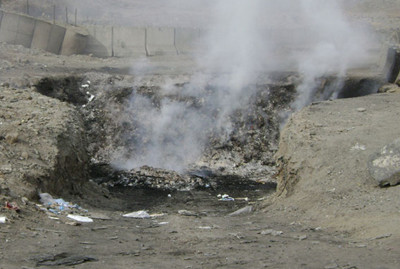Washington Guardian, April 25, 2013
Army paid 5 million USD for garbage incinerators it never used in Afghanistan
A U.S. military base is back to burning garbage in open pits after wasting 5 million USD on two incinerators it never used
BY John Solomon
Talk about burning taxpayer money!
The U.S. Army Corps of Engineers spent more than $5 million to have a contractor build two garbage incinerators at a forward-operating base in Afghanistan, but then the military never used the equipment because officials closed out the project and released the contractors before the machines actually worked.
So troops at the Salerno forward-operating base are back to burning their garbage in open-pit fires, despite health concerns over breathing toxic fumes. And the unused incinerators have created their own health worries, allowing stagnant rain water to pool around them and form a potential breeding ground for malaria-infested mosquitos.
The whole scenario has left the chief U.S. watchdog in Afghanistan incredulous.
“These incinerators didn’t burn trash, but they did burn up taxpayer money. Worse, using open-air burn pits in their place puts the health of our troops at risk,” said John Sopko, the Special Inspector General for Afghanistan.
For failing to demand more from its contractors and wasting precious tax dollars as the U.S. mission winds down in Afghanistan, the U.S. military wins this week's Golden Hammer, a distinction awarded by the Washington Guardian to the worst examples of misspending in government.

Photo: Military.com
The U.S military command in Afghanistan can't explain why it accepted the incomplete incinerators and paid the contractors, but it says it is "looking for a solution to dismantle the incinerators" so they don't gather more stagnant water. In the meantime, U.S. officials have treated any standing water with chemicals to keep disease risks downs.
Officials added they can't find a "feasible course of action" to get rid of the trash, and so they are going to give the base a waiver from current military regulations to allow it to keep burning trash in open pits because it believes the health risks are minimal.
In other words, taxpayers are out $5 million, and the soldiers at the base are none the better for it.
Sopko's office has highlighted a steady stream of wasted money in Afghanistan, from insulation that has created fire risks in structure the U.S. built for Afghan soldiers to as much as $1 billion in missing fuel funds, some of which are feared to have gone to U.S. enemies.
But the story of the unused incinerators leaves a particularly poignant example of apathy to taxpayers' concern. Investigators who went to Afghanistan found the unused incinerators covered in bird excrement and succintly explained how the whole scenario came to be.
"FOB Salerno spent $5 million constructing incinerators and supporting facilities that it will never use. The two 8-ton capacity incinerators generally met technical specifications and were properly sized for the base’s daily solid waste, assuming they could operate 24 hours per day.
"SIGAR found that the base’s threat conditions would limit the incinerators’ use to no more 12 hours per day, allowing it to process only 50-57 percent of the daily solid waste. Therefore, if the incinerators were used, the base would still have to rely on other means—such as open-air burn pit operations—for its solid waste disposal. However, there are health concerns with breathing the smoke emissions from open-air burning.
"Although construction was never fully completed due to open 'punch list' items, FOB Salerno officials accepted the facilities and closed the contract. Also, due to the lack of maintenance the facilities have fallen into disrepair. In one case, stagnant water has formed in an area beneath the incinerators, thereby creating a possible health hazard from malaria-infected mosquitoes."
The folly continues even since Sopko wrapped up his investigation. The military is planning to hire a contractor to haul garbage away from the base starting in July. The only problem is the base is scheduled to close just a few months after that, and U.S. officials have not conducted a cost-benefit analysis on whether that approach makes sense.
Sopko's investigators offered a simple solution: "Our recommendation is simply to begin trash removal at an earlier date," the inspector general wrote, so that open-pit fires don't need to be used.
Characters Count: 4992
